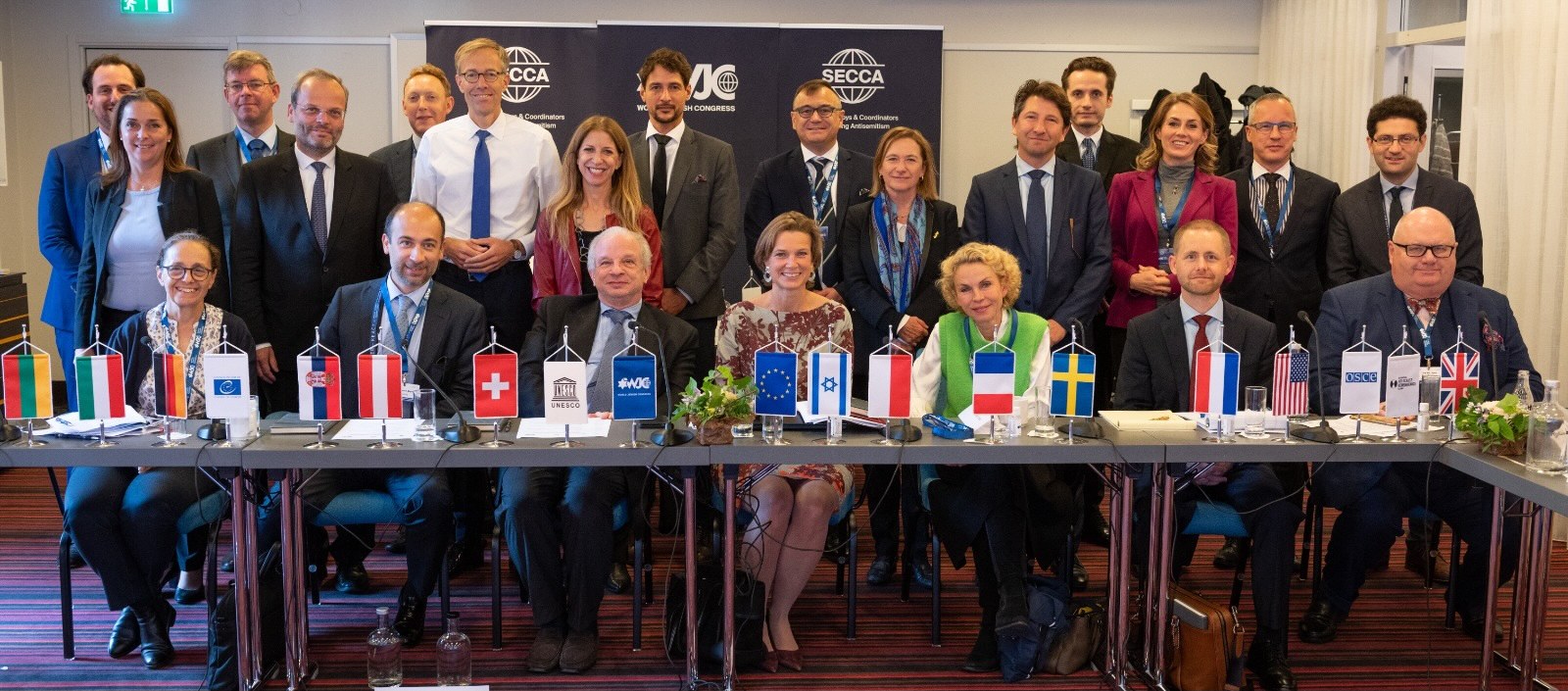MALMÖ, Sweden – The World Jewish Congress convened dozens of governmental and NGO officials working to monitor and combat antisemitism for a closed-door meeting a day after the Malmö International Forum on Holocaust Remembrance and Combating Antisemitism.
Organized by the WJC and the European Commission, the sixth International Meeting of Special Envoys & Coordinators Combating Antisemitism (SECCA) met in-person in Malmö with some participants joining virtually to discuss how best to execute national and organizational pledges to fight antisemitism and Holocaust distortion. These pledges were made Wednesday at the global antisemitism forum. Katharina von Schnurbein, SECCA co-chair and European Commission coordinator for Combating Antisemitism and Fostering Jewish Life, presented the first-ever EU strategy on the issues at hand. The comprehensive plan was reviewed with the participating envoys and Jewish community representatives and positively welcomed.
After the forum, von Schnurbein said, “I was honored to co-chair the sixth WJC SECCA meeting, in Malmö, and hear the concrete fresh pledges from so many countries on fighting antisemitism, fostering Jewish life and Holocaust remembrance, education and research. This international exchange allows us to join forces and reflect on how to best implement the new EU strategy on combating antisemitism and fostering Jewish life, in the EU and beyond.”
WJC Commissioner for Combating Antisemitism Julius Meinl described contemporary challenges facing the Jewish people and democratic society, before detailing the WJC’s Malmö International Forum pledge that includes commitments to governments, law enforcement, international and civil society organizations, interfaith partners, internet and social media companies, and Jewish communities. He also announced that WJC would continue to collaborate with social media platforms and companies on improving the enforcement of related policies and would continue to monitor and report incidents via cooperative channels such as “trusted flagger” and “community partnership” programs.
Also of note, WJC will work with governments to develop and implement national strategies. Several envoys shared their work on national action plans, including France’s Ambassador-at-large Delphine Borione; Romania’s Special Representative for Promoting the Policies of Memory, for Fighting against Antisemitism and Xenophobia Dr. Alexandru Muraru; and Austria’s head of the Task Force on Austrian-Jewish Cultural Heritage in the Federal Chancellery, Dr. Antonio Martino.
The importance of governments and organizations appointing coordinators or special envoys for combating antisemitism was also widely discussed.
The SECCA forum continues to evolve, as more institutions fill this critical role. Fernando Lottenberg, newly appointed Organization of American States commissioner to Monitor and Combat Antisemitism, joined the meeting from Brazil to express his appreciation for the opportunity to connect with colleagues. Lottenberg, a former WJC vice president, spoke of the history of persecuted Jews in Latin America, beginning with the Spanish Inquisition, and how it differs from anti-Jewish hatred in Europe and other regions. Lottenberg emphasized that antisemitism is not just a Jewish issue, but a “problem for the Americas,” and said he intended to work with his counterparts in the United States, Canada and Europe to rid the western hemisphere of this phenomenon.
Acting Deputy Nathan George addressed the forum on behalf of United States Deputy Assistant Secretary Karen McDonald. George noted that antisemitism has continued rising at alarming rates since SECCA last met in May 2021, including the appalling consequences of the recent Israel-Hamas conflict, which resulted in an 80% increase in antisemitic incidents in the United States. George quoted US President Joe Biden, responding to this surge, saying “we have seen that no community is immune. We must all stand together to silence these terrible and terrifying echoes of the worst chapters in world history, and pledge to give hate no safe harbor”.
The assembled envoys engaged in a spirited conversation on various internet platforms, detailing the progress made with companies such as TikTok and Facebook as well as the struggle with messaging service Telegram to moderate the pervasive hate speech and incitement in its channels.
Participants, including Lord Eric Pickles, United Kingdom special envoy for post-Holocaust Issues; Eddo Verdoner, the Netherlands’ national coordinator for Antisemitism; Swedish Ambassador-at-large Ulrika Sundberg; Daniel Höltgen, special representative on antisemitic, anti-Muslim and other forms of religious intolerance and hate, Council of Europe; and Dr. Felix Klein, federal government commissioner for Jewish Life in Germany and the Fight against Antisemitism, debated issues of regulation and prosecution and the “gray areas” that exist in this realm.

The State of Israel was represented by Shuli Davidovich, head of the Foreign Ministry’s Bureau for World Jewish Affairs and World Religions, and Ruth Cohen-Dar, director of the Department for Combating Antisemitism and Holocaust Remembrance. They outlined Israel’s support of Jews in the Diaspora and shared Israel’s perspective toward other governments. Cohen-Dar highlighted the importance of the International Holocaust Remembrance Alliance working definition of Holocaust denial and distortion in addition to the widely heralded working definition of antisemitism.
Envoy after envoy addressed society’s rampant antisemitism and the concrete actions their governments and organizations were undertaking to protect Jewish life.
WJC Executive Vice President Maram Stern closed the meeting by in particular thanking the Swedish government and Amb. Sundberg for organizing the Malmö International Forum on Holocaust Remembrance and Combating Antisemitism. Stern also urged the French government to take a strong stand for Jewish communities and against antisemitism when it assumes the European Union presidency in 2022.








